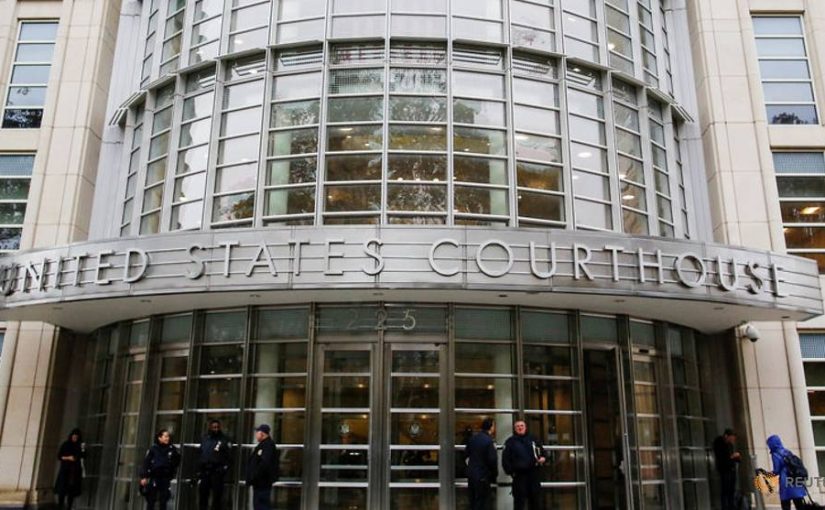Mozambique: Police officers suspended at Incoluane checkpoint - AIM report
Unnamed Mozambicans on US indictment

Reuters
The establishment and financing of the three fraudulent Mozambican companies at the heart of the largest financial scandal in the country’s history involved more people than the five individuals so far arrested, according to the full indictment in the case, drawn up by the United States district court of the Eastern District of New York, a copy of which is in AIM’s possession.
The companies – Ematum (Mozambique Tuna Company), Proindicus and MAM (Mozambique Asset Management) – obtained loans of over two billion US dollars from the European banks, Credit Suisse and VTB of Russia.
On paper, the companies existed to set up a tuna fishing fleet, and to provide coastal security. In fact, their true purpose was to syphon money into the private pockets of Mozambican officials, and senior staff at Credit Suisse, and at the contractor for the three companies, the Abu Dhabi-based concern, Privinvest.
To date, on the basis of international warrants issued by the US authorities, five people have been arrested: they are former Mozambican Finance Minister Manuel Chang, three former Credit Suisse managers, in the bank’s Global Financing Group, Andrew Pearse, Surjan Singh and Detelina Subeva, and Jean Boustany, who was the lead salesman and negotiator for Privinvest.
But two other Mozambicans have also been indicted – so far we do not know who they are because their names have been blacked out in the indictment.
There are also three unnamed and unindicted Mozambican “co-conspirators”. The indictment gives a few details about each of them, from which it may be possible to deduce their identities. One is described as “involved in obtaining the Mozambican government’s approval for the Proindicus project, a second is “a relative of a senior official of Mozambique”, and the third “was a senior official in Mozambique’s Ministry of Finance and a director of Ematum”.
There are also two “co-conspirators” from Privinvest. One “was hired by Privinvest to develop business with African nations through African government officials”, and the second “was a principal executive of Privinvest”.
It is thought that these five “co-conspirators” may have escaped indictment by cooperating with the American prosecutors.
Summarising the fraud, the indictment says that between 2013 and 2016 “the co-conspirators conspired to defraud investors and potential investors in the Proindicus, Ematum and MAM financings through numerous material misrepresentations and omissions”, which included “bribe and kickback payments to Mozambican government officials and bankers”. The deceit also covered issues such as the amount and maturity dates of the debt incurred by Mozambique and “Mozambique’s ability and intention to pay back the investors”.
The indictment notes that the borrowed money was paid directly to Privinvest, as the sole contractor for the maritime projects the three companies were supposed to implement. But in reality, Chang and the other defendants “created the maritime projects as fronts to raise money to enrich themselves and intentionally diverted portions of the loan proceeds to pay at least 200 million dollars in bribes and kickbacks to themselves, Mozambican government officials and others”.
The indictment reaches the same conclusion as Kroll Associates, the company which audited Proindicus, Ematum and MAM in 2017 – namely that the fishing and patrol boats and other assets provided by Privinvest were grossly overpriced.
“The co-conspirators applied only a portion of the loan proceeds towards the maritime projects”, the indictment says. “In furtherance of the scheme, Privinvest charged inflated prices for the equipment and services it provided, which were then used, at least in part, to pay bribes and kickbacks”.
The American prosecutors base much of their case on e-mails and other communications between the defendants, which show a persistent pattern of bribery.
The communications also show that the coastal protection scheme, far from being vital to Mozambican sovereignty, was not a Mozambican idea at all. As from 2011, Boustany and “Privinvest co-conspirator 1” were working to persuade Mozambican officials to enter into a contract with Privinvest for coastal protection. Part of these discussions concerned the bribes that should be paid to guarantee the contract.
In November 2011, one of the Mozambicans whose names have been blacked out sent an e-mail to Boustani stating “To secure that the project is granted the go-ahead by the HoS (Head of State – i.e. the then President, Armando Guebuza), a payment has to be agreed before we get there, so that we know and agree, well in advance, what ought to be paid and when”.
What were euphemistically described as “advance payments”, the message said, “can be built into the project and recovered”.
In a message of 28 December 2011, Boustani was talking numbers. In an e-mail exchange with one of those whose names have been redacted, he agreed to bribes of 50 million dollars for Mozambican officials.
The exact sum was discussed at the Mozambican end and the unnamed defendant sent an e-mail to Boustani containing the immortal words “Fine brother, I have consulted and please put 50 million chickens. Whatever numbers you have on your poultry, I will add 50 million of my breed”.
Boustani, on the same day, forwarded this e-mail to other Privinvest staff stating “50M for them and 12M for (Privinvest Co-conspirator 1) (five per cent) = total of 62M on top”.
The negotiations, however, dragged on until January 2013 when Privinvest and Proindicus signed the agreement for a coastal protection system. A few days later Boustani instructed a bank in the United Arab Emirates to pay 5.1 million dollars to each of two unnamed Mozambicans, with a further 3.4 million dollars each at later dates.
It seems that these sums were in addition to the “50 million chickens”.
Read: Boustani-et.-al.-indictment-ednyredacted (Full Document)













Leave a Reply
Be the First to Comment!
You must be logged in to post a comment.
You must be logged in to post a comment.